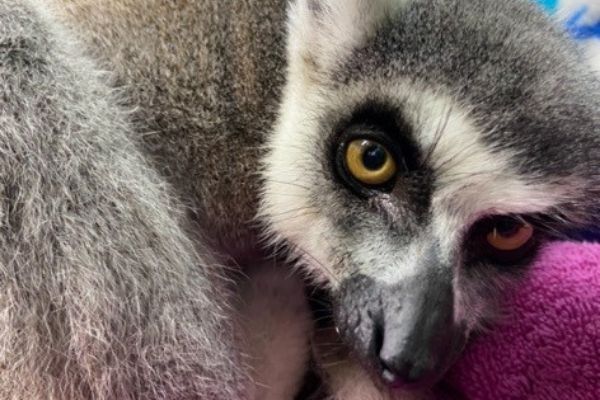Meet Ruth, the ring-tailed lemur estimated to be about 5 or 6 years old, who was recently brought to Primarily Primates by authorities after allegations of abuse by her owner. Ruth’s companion had died due to neglect, and she arrived scared and depressed at the sanctuary. She also arrived frail and thin. Ruth’s story underscores why lemurs, like all primates, should never be kept as pets
Lemurs, native to Madagascar, are the most endangered group of mammals on Earth, with 95% of species facing a high risk of extinction. Yet shockingly, in some states in the U.S., it’s perfectly legal to own an animal as endangered and exotic as a lemur. In fact, there are an estimated 15,000 pet primates in the United States, and purchasing one is relatively easy: a couple thousand dollars and a click to an online pet store is all it takes, according to the Duke Lemur Center.
Even though most pet lemurs who are sold in the U.S. are bred here, it does not make the issue any less serious. An infant lemur destined to become a pet is taken from its mother on the day of its birth, and that traumatic early separation can have serious physiological and behavioral consequences.
In the wild, lemur mothers carry their babies constantly for the first four months, parenting contact that is critical for normal development. Not to mention that proper lemur care is challenging even for experts, which makes them vulnerable to abuse.
Lemur diets, for instance, are notoriously difficult to get just right in captivity, and it was obvious Ruth had been fed incorrectly, according to Krystal Mathis, executive director of Primarily Primates.
“While lemurs eat a variety of plant material on the island of Madagascar where they’re from, the fruit that is available there is much different and less sugary than the genetically-modified produce available in the U.S.,” Mathis said. “We don’t know what she was fed previously, so we tried to slowly get her used to a proper diet. Even though she liked her new food, she was too scared and depressed to eat much. Caretakers had to spend hours with her to form a relationship and help her out of her malaise.”
Thanks to the diligent and caring PPI care staff, Ruth has begun eating well and has even put on weight. And now that her quarantine period is up, she is being slowly introduced to other lemurs. For now, that means placing Ruth in a carrier outside our lemur habitats so everyone can see each other and we can monitor how the others react to her and vice versa. Our goal is to see Ruth integrate into a lemur group at PPI, and we won’t stop until we find the perfect match.
If you’d like to sponsor a lemur here at Primarily Primates, click here.

